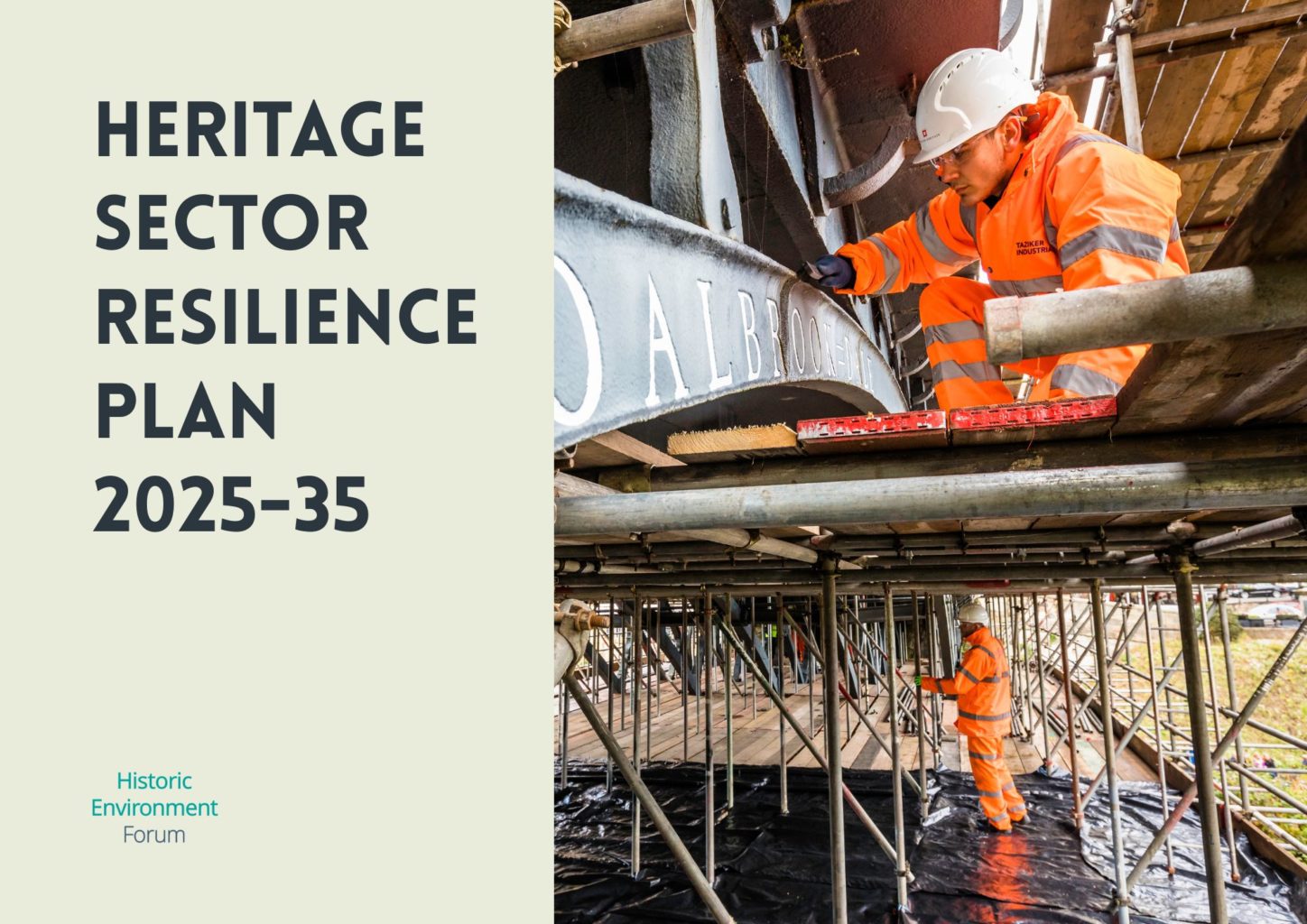
On 19 June 2025 the Historic Environment Forum (HEF) launched its new Heritage Sector Resilience Plan 2025-35 (HSRP2).
The plan provides a clear roadmap for partnership working to deliver a robust and resilient heritage sector.
Learn more and download the plan from the new dedicated section of HEF’s website: Heritage Sector Resilience Plan.
The evaluation will cover two lines of enquiry:
As part of this work, the consultant is expected to:
Full details can be found here: Evaluation Consultant Brief.docx.
The budget available for this work is £20,000 (including VAT and expenses).
The deadline for applications is 6th May 2025. Questions and applications can be submitted to Francesca Benetti, Task Group Manager: heftask2@historicenvironmentforum.org.uk.

I’m Lydia, and I’ve been Head of Policy and Communications at the Heritage Alliance for the past 2 years (almost!). We work to champion the contribution of heritage to wider public policy priorities, and to represent our 200+ members as well as the wider sector. Our membership covers the breadth of heritage, from the very large to the very small – national charities with millions of visiting members alongside individual museums, railways and churches. My job is to focus on the issues that unite them whilst ensuring that individual voices are heard in our communications to government and parliament. On a day-to-day basis I will have conversations with members about everything from graveyards to shipwrecks – every day is different and reflects the fantastic diversity of our sector.
The Heritage Alliance was set up 20 years ago to provide a united voice for the heritage sector to government, and today we are an active and trusted advisor to DCMS and arms-length bodies. We sit on the Heritage Council and the Historic Environment Forum, as well as collaborating on a number of working groups with Historic England.
We also host five of our own advocacy groups focused around spatial planning, rural heritage, mobile heritage, skills and education, and funding and investment – these are a key way we create a two-way flow of information and insight with our members. Everything we do is informed by the priorities identified by our membership network, and we amplify their evidence and expertise to decisionmakers to influence positive change for our sector. Our members also contribute to our policy publications and reports highlighting the latest evidence and case studies from the breadth of the sector – in 2024 we published the Heritage Manifesto and our On the Brink report.
The Heritage Manifesto provides a shared vision for the future of the sector – it provides a hymn sheet for the whole sector to utilise, strengthening our collective voice. Over the past 18 months we have been working to share the priorities in the Manifesto with all political parties and beyond our own sector, finding common ground with the creative industries, environmental, charity, arts and construction sectors. This effort has been paying off, and we have had the opportunity to make the case for heritage at party conferences, in cross sector forums and with key decisionmakers.
Our ‘On the Brink’ cost-of-living report also helps to underscore the challenges the sector has been facing, and what’s needed to shore up the foundations of the sector. Through this report we’ve aimed to provide a ‘state of the sector’ snapshot which collates all the evidence together in one place, but which is also constructive and offers up sector-led solutions to the five key issues we identified (skills and staffing gaps, funding shortages, cost cutting, energy costs, and changes in consumer behaviour).
Advocacy is a team sport, so when campaigning efforts make a difference (for example getting heritage issues in election manifestos, or securing amendments to the Levelling Up and Regeneration Bill) it’s a shared success. Finding common ground is key to that, even though defining and communicating shared messages widely can be half the battle. We try to ensure smaller heritage organisations can join in these conversations and equip themselves with the tools they need to campaign for their issues, even if they don’t have any in-house advocacy capacity. It’s brilliant when our members take the initiative and contact their MPs to arrange visits, or share new evidence and case studies with us – it all helps to make the case.
Getting heritage on the agenda is also an achievement in itself, especially with so many competing priorities in a new term of government. Beyond that, success is creating the space to be proactive and deliver the evidence and campaigns that tell a positive story about our sector. It often feels like we are on the back foot warding off threat after threat, but it’s usually the advocacy which focuses on benefits and solutions which breaks through and captures people’s imagination.
Join us and be part of a network of over 200 heritage organisations! Even if you’re not a member, you can subscribe to our newsletter Heritage Update to get a fortnightly download on sector updates. Check out our advocacy toolkit to share the Heritage Manifesto with your MP, and find all our reports and evidence on our publications page. We are on X, Bluesky and LinkedIn as @Heritage_NGOs.
There is an unfair perception that our sector is resistant to change, which we need to be proactive in challenging. Demonstrating how we are directly relevant to current public policy priorities and keeping up with fresh evidence is key, and to keep banging the drum that heritage offers up solutions, not barriers. As far as possible we need to keep speaking with one voice on this – we may not agree on everything, but as a sector we have a positive story to tell together.
Overall, I would like to see heritage better recognised as a catalyst for public good – it’s one of our greatest assets as a country and on everyone’s doorstep, but its potential hasn’t been fully realised yet. That is the main message we need to get across to safeguard the future of the sector – heritage isn’t just bits of the past, it’s in the here and now, ready to help us tackle 21st century challenges.
This Sector Resilience interview was shared by Lydia as part of our Heritage Sector Resilience Plan activities.
If you’d like to contribute an interview as part of the series, follow the link below to find out more:
December 2024
Bringing together senior members of staff from public and non-government bodies to work collaboratively on strategic matters for the historic environment sector.